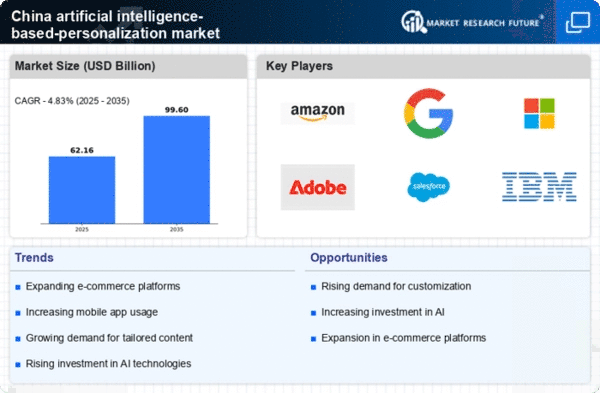Rising Consumer Expectations
The artificial intelligence-based-personalization market in China is experiencing a surge in consumer expectations for tailored experiences. As digital literacy increases, consumers demand more personalized interactions across various platforms. This trend is evident in e-commerce, where 70% of consumers express a preference for personalized recommendations. Companies are leveraging AI to analyze consumer behavior and preferences, thereby enhancing customer satisfaction and loyalty. The ability to deliver customized content and product suggestions is becoming a critical differentiator in a competitive landscape. As a result, businesses are investing heavily in AI technologies to meet these rising expectations, which is likely to drive growth in the artificial intelligence-based-personalization market.
Advancements in AI Algorithms
The continuous advancements in AI algorithms are significantly impacting the artificial intelligence-based-personalization market in China. Innovations in machine learning and deep learning techniques enable more accurate predictions of consumer behavior. For instance, the implementation of neural networks has improved the ability to analyze vast datasets, leading to more effective personalization strategies. This technological evolution is expected to enhance the efficiency of marketing campaigns, with companies reporting up to a 30% increase in conversion rates when utilizing advanced AI algorithms. As these technologies evolve, they are likely to further transform the landscape of personalized marketing, driving demand within the artificial intelligence-based-personalization market.
Increased Mobile Device Usage
The proliferation of mobile devices in China is reshaping the artificial intelligence-based-personalization market. With over 1 billion smartphone users, companies are focusing on mobile-first strategies to engage consumers effectively. Mobile applications are increasingly integrating AI technologies to provide personalized content and recommendations based on user behavior. This shift is particularly relevant as studies indicate that mobile users are 50% more likely to engage with personalized advertisements. As mobile device usage continues to rise, the demand for AI-driven personalization solutions is expected to grow, further stimulating the artificial intelligence-based-personalization market.
Growth of E-commerce Platforms
The rapid growth of e-commerce platforms in China is a pivotal driver for the artificial intelligence-based-personalization market. With online retail sales projected to reach $2 trillion by 2025, businesses are increasingly adopting AI-driven personalization strategies to enhance user experience. E-commerce giants are utilizing AI to analyze shopping patterns and preferences, allowing for tailored marketing efforts that resonate with individual consumers. This trend not only boosts sales but also fosters customer loyalty, as personalized experiences are shown to increase repeat purchases. Consequently, the expansion of e-commerce is likely to propel the artificial intelligence-based-personalization market forward.
Government Support for AI Initiatives
The Chinese government is actively promoting AI initiatives, which serves as a crucial driver for the artificial intelligence-based-personalization market. Through various policies and funding programs, the government aims to position China as a leader in AI technology. This support includes investments in research and development, as well as incentives for companies adopting AI solutions. As a result, businesses are more inclined to invest in AI-driven personalization strategies, knowing that they have governmental backing. This environment is likely to foster innovation and growth within the artificial intelligence-based-personalization market, as companies seek to leverage AI to enhance their competitive edge.
















